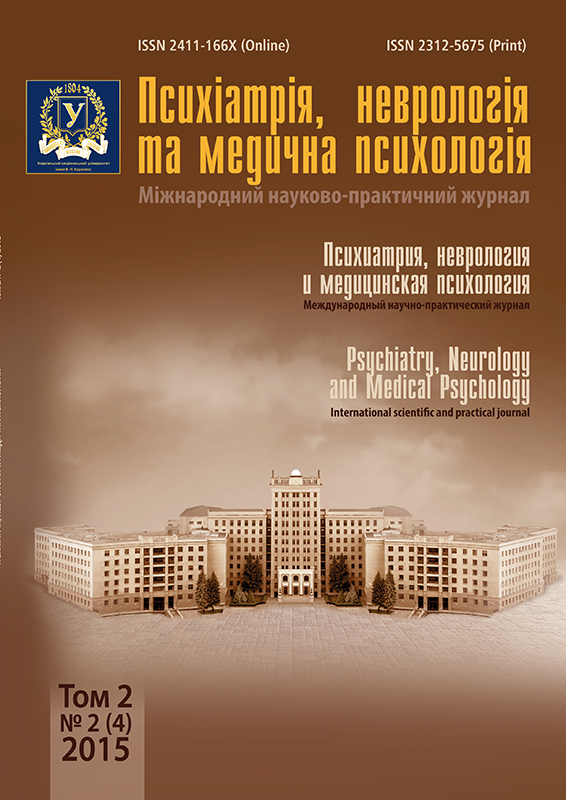Optimi (Online Predicative Tools For Intervention In Mental Illness). Biofeedback Based On Heart Rate Variability As A Preventive Tool Against Stress-Related Disorders
Abstract
Portable health management devices such as mobile phones, based on the biofeedback principle, are becoming increasingly attractive for scientists and individuals who strive to achieve a healthier lifestyle. Portable health management devices such as mobile phones equipped with sensors to provide biofeedback are becoming increasinglyattractive to scientists and other individuals who strive to achieve a healthier lifestyle. Under the auspices of the OPTIMI project we have developed and tested a new ECG biofeedback sensor. This sensor monitors heart rate variability as an indication of a participant's level of stress and relaxation. In the study, participants practiced slow, conscious, meditative breathing while observing biofeedback in the form of visual stimulation from the sensor. The training was carried out in healthy volunteers, who as a result of the biofeedback exercises could improve their coping strategies.
Downloads
References
Swan M. Health 2050: The Realization of Personalized Medicine through Crowdsourcing, the Quantified Self, and the Participatory Biocitizen. Journal of Personalized Medicine, 2012, no. 2(4), pp . 93-118.
Andrews G., Cuijpers P., Craske M. G. [et al.] Computer therapy for the anxiety and depressive disorders is effective, acceptable and practical health care: a meta-analysis. PloS One, 2010, no. 5(10), pp. 1319-1371.
Barak A., Grohol J. M. Current and Future Trends in Internet-Supported Mental Health Interventions. Journal of Technology in Human Services, 2011, no. 29 (3), pp.155-196.
McCrone P. Cost-effectiveness of computerised cognitive-behavioural therapy for anxiety and depression in primary care: randomised controlled trial. The British Journal of Psychiatry, 2004, no. 185(1), pp. 55-62.
Rose R. D., Buckey J. C., Zbozinek T. D. [et al.] A randomized controlled trial of a self-guided, multimedia, stress management and resilience training program. Behaviour Research and Therapy, 2013, no. 51 (2), 1, pp. 6-12.
Zetterqvist K., Maanmies J., Ström L., Andersson G. Randomized controlled trial of internet-based stress management. Cognitive Behaviour Therapy, 2003, no. 32 (3), pp. 151-160.
Alcañiz M., Botella C., M. Baños R. [et al.] The Intelligent e-Therapy system: a new paradigm for telepsychology and cybertherapy. British Journal of Guidance & Counselling, 2009, no. 37 (3), pp. 287-296.
Zaichkowsky L., Fuchs C. Z. Biofeedback applications in exercise and athletic performance. Exercise and Sport Sciences Reviews, 1988, no. 16, pp. 381-421.
Lee J., Finkelstein J. Evaluation of a portable stress management device. studies in health technology and informatics. Studies in Health Technology and Informatics, 2015, no. 208, pp. 248-252.
Friedman B. H., Thayler J. F. Autonomic balance revisited: Panic anxiety and heart rate variability. Journal of Psychosomatic Research, 1998, no. 44 (1), pp. 133-151.
Appelhans B. M., Luecken L. J. Heart rate variability as an index of regulated emotional responding. Review of General Psychology, 2006, no. 10 (3), pp. 229-240.
Lehrer P. M. How Does Heart Rate Variability Biofeedback Work? Resonance, the Baroreflex, and Other Mechanisms. Biofeedback, 2013, no. 41 (1), pp. 26-31.
Lehrer P. M., Vaschillo E., Vaschillo B. Resonant Frequency Biofeedback Training to Increase Cardiac Variability: Rationale and Manual for Training. Biofeedback, 2000, no. 25 (3), pp. 177-191.
Vrijkotte T. G. M., van Doornen L. J. P., de Geus E. J. C. Effects of Work Stress on Ambulatory Blood Pressure, Heart Rate, and Heart Rate Variability. Hypertension, 2000, no. 35 (4), pp. 880-886.
Chen S., Sun P., Wang S., Lin G., Wang T. Effects of heart rate variability biofeedback on cardiovascular responses and autonomic sympathovagal modulation following stressor tasks in prehypertensives. Journal of Human Hypertension, 2015, no. 10 (3), pp. 2015-2027.
Cohen S., Kamarck T., Mermelstein R. A global measure of perceived stress. Journal of Health and Social Behavior, 1983, no. 24 (4), pp. 385-396.
Beck A. T., Steer R. A., Brown G. K. Manual for Beck depression inventory-II. San Antonia, TX, Psychological Corporation, 1996, pp. 588-597.
Copyright (c) 2016 L. Fritzsche, M. Fritzsche, D. Majoe

This work is licensed under a Creative Commons Attribution 4.0 International License.

